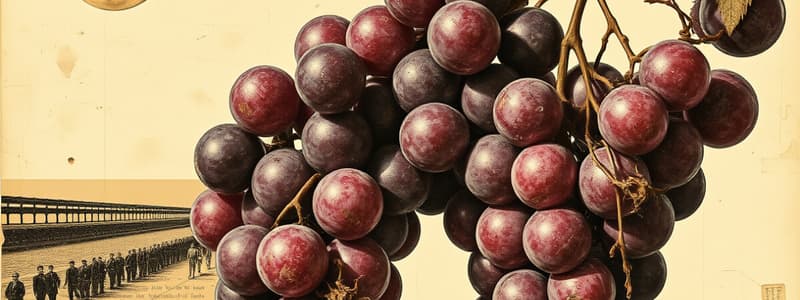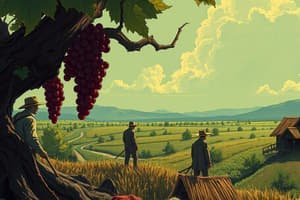Podcast
Questions and Answers
What metaphor does the author use about the migrant people?
What metaphor does the author use about the migrant people?
He portrays them as bugs.
What happens to the migrant people at night?
What happens to the migrant people at night?
They unite to one group and share each other's bitterness and concern.
What do the migrant people get used to doing in this new lifestyle?
What do the migrant people get used to doing in this new lifestyle?
They get used to building rules in the new world.
What is the worst punishment for violating these rules?
What is the worst punishment for violating these rules?
How is the technique of building changing? What is the world getting close to?
How is the technique of building changing? What is the world getting close to?
What do those panic families do?
What do those panic families do?
How do these two boys know each other?
How do these two boys know each other?
What are their after dinner discussions?
What are their after dinner discussions?
What happens to the camping place when it is day?
What happens to the camping place when it is day?
Flashcards are hidden until you start studying
Study Notes
Metaphor of Migrant People
- Migrant people are described metaphorically as bugs, suggesting fragility and vulnerability in their circumstances.
Nightly Unity
- At night, migrant individuals come together, sharing their bitterness and concerns, forming a cohesive unit.
Construction of New Rules
- Migrants establish new social rules that prioritize respect for elders and protection for vulnerable groups.
- They abandon passive acts, instead forming unions that govern their interactions and behaviors.
Punishments for Rule Violations
- Severe penalties for breaking social rules include ostracism and violent confrontations.
- Ostracism is the harshest punishment, leading to lifelong shame and isolation from the community.
Evolution of Rights and Fairness
- The rights within the migrant community are enhanced, resulting in improved living conditions and fairness.
- Unions begin to prioritize human rights, such as proper burials for children, fostering a familial atmosphere.
Behavior of Panic Families
- Panic-driven families long for the connection of the migrant community, often sleeping in their cars or moving into tents.
- They integrate into the union, sometimes even reuniting with lost relatives in the process.
Connection Between Boys
- Two boys bond over a shared stone, strengthening their connection through gossip and the discovery of familial ties.
Evening Discussions
- After dinner, children express unhappiness after noticing others with better food.
- They reminisce about their lives before displacement and contemplate their uncertain futures.
Daily Camping Dynamics
- During the daytime, migrant families pack up and leave, making way for new groups to take over the camping area.
Studying That Suits You
Use AI to generate personalized quizzes and flashcards to suit your learning preferences.




